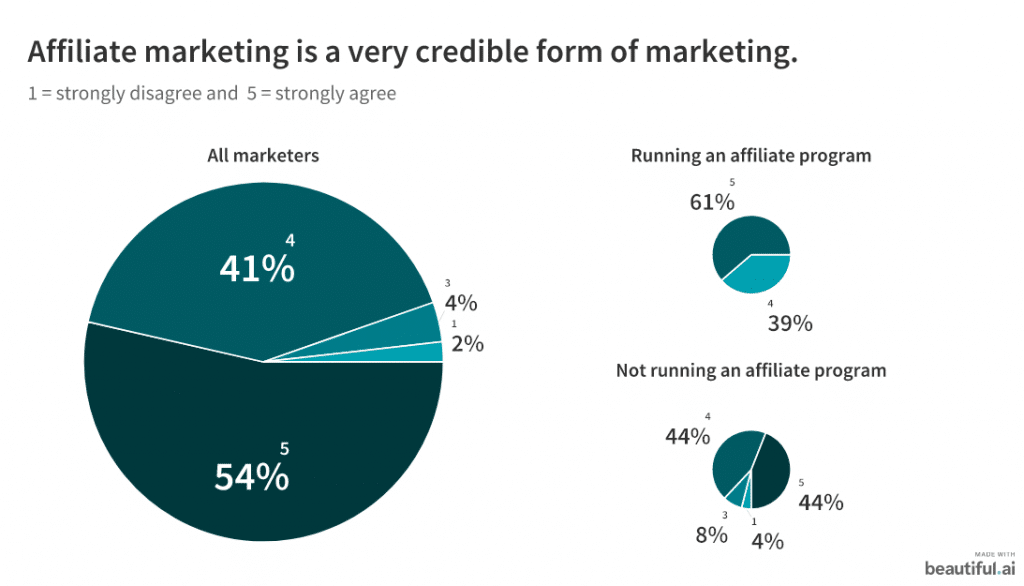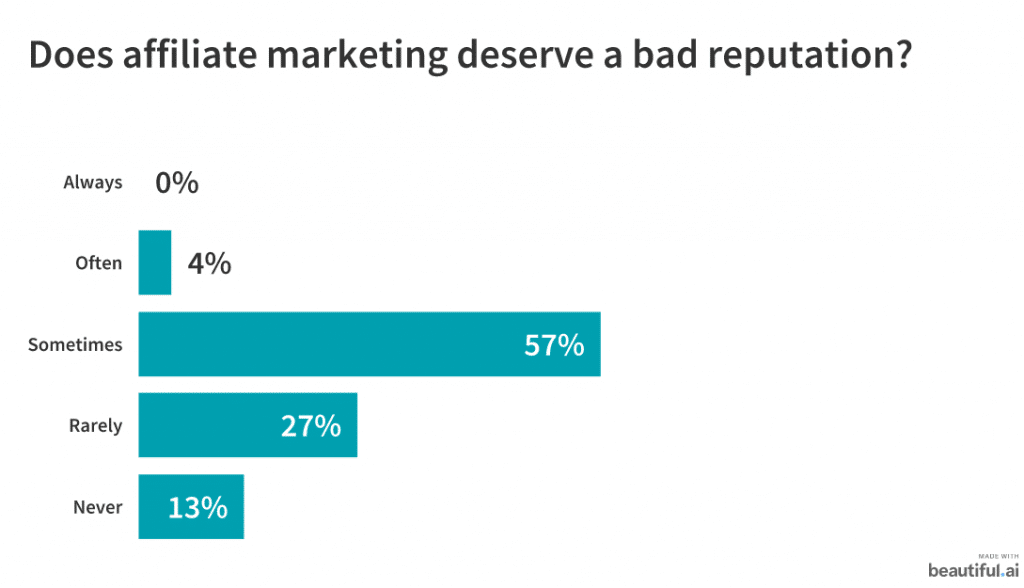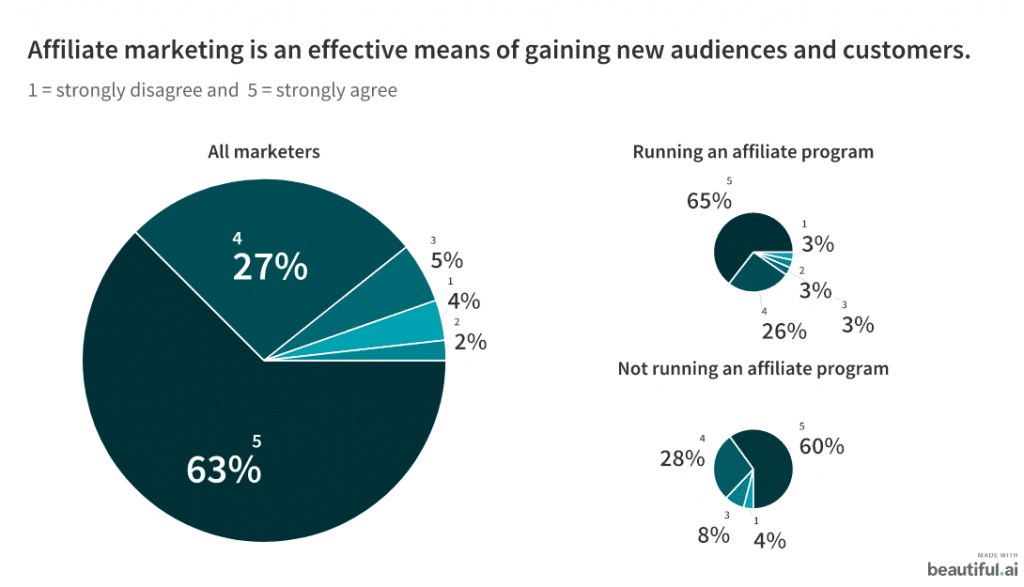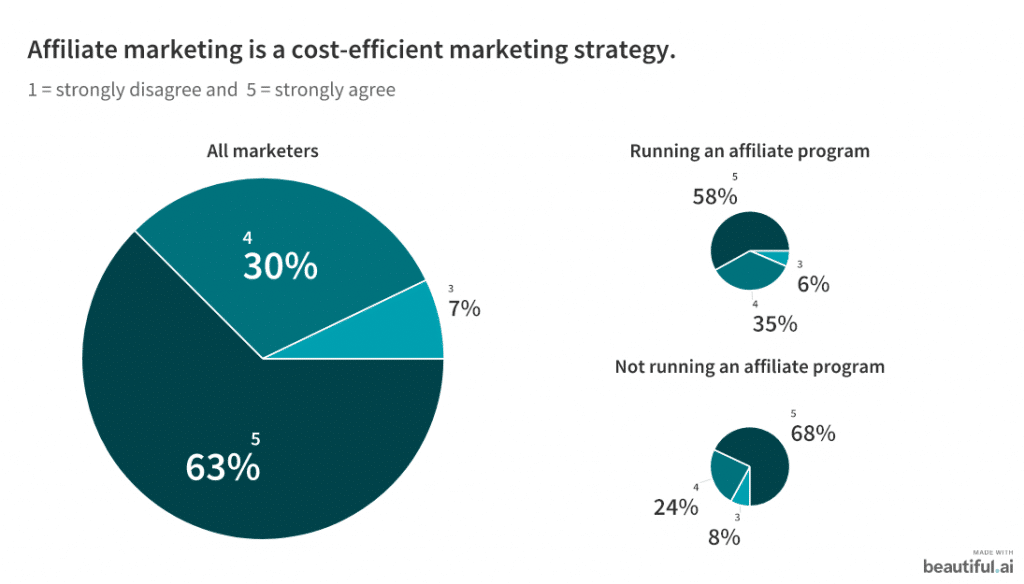In an affiliate marketing program, content creators place unique affiliate links to your business’ website on their own channels, including blog posts and social media posts. Whenever someone clicks on the affiliate link and makes a purchase, the affiliate is rewarded with a cash commission from your business.
One of the biggest debates involving marketing, though, is whether affiliate marketing is worth the time or too risky.
Affiliate programs offer plenty of benefits to a business when done right, and when you partner with affiliates who act ethically. But affiliate marketing also has a bad reputation. Some affiliates engage in fraudulent, scammy behavior, and some misrepresent the products they promote in order to quickly ramp up their commission.
We wanted to know what the marketing community thinks of affiliate marketing. Does it deserve the questionable reputation it has gained? Or, do the benefits of affiliate marketing outweigh the bad name some have given it?
So, we ran a survey to find out if marketers believe affiliate marketing is good or bad, and 56 marketers responded with their insights and opinions on the biggest benefits and drawbacks of affiliate marketing.
- 31 of these marketers currently run an affiliate marketing program at their business.
- 14 aren’t currently running an affiliate program, but are thinking of starting one.
- 11 aren’t currently running an affiliate program, and don’t plan to.
So, is affiliate marketing good or bad? Let’s find out.
Is affiliate marketing credible?
We wanted to see how many marketers believe affiliate marketing is a very credible form of marketing, asking them to rate it on a scale of 1 to 5 (1 for “strongly disagree” and 5 for “strongly agree”).
On the whole, most marketers believe that affiliate marketing is credible, with many engaged in affiliate programs themselves. Everyone currently running a program rated affiliate marketing a 4 or 5 for credibility. To remove any bias, we separated our average ratings into three segments: marketers running an affiliate program, marketers not running a program, and total marketers. As it turns out, those with a program rated affiliate marketing only slightly higher.
Affiliate marketing is a very credible form of marketing.
- Average of all respondents: 4.45
- Average of the 25 not running a program: 4.24
- Average of the 31 currently running a program: 4.61
We also asked marketers whether they believe affiliate marketing deserves a bad reputation. Their feelings were clear: Affiliate marketing sometimes deserves a bad reputation due to unethical affiliates and programs, but certainly not always.
- None of the 56 marketers said affiliate marketing “always” deserves a bad reputation.
- 2 (4%) said it “often” deserves a bad reputation
- 32 (57%) said it “sometimes” deserves a bad reputation
- 15 (27%) said it “rarely” deserves a bad reputation
- 7 (13%) said it “never” deserves a bad reputation
Among the 25 who don’t currently run an affiliate program:
- 1 (4%) said affiliate marketing “often” deserves a bad reputation
- 17 (68%) said it “sometimes” deserves a bad reputation
- 7 (28%) said it “rarely” deserves a bad reputation
Marketers who aren’t running a program agree that affiliate marketing deserves a bad reputation on at least some occasions, but again, not always.
Among the 31 who currently run an affiliate program:
- 1 (3%) said affiliate marketing “often” deserves a bad reputation
- 15 (48%) said it “sometimes” deserves a bad reputation
- 8 (26%) said it “rarely” deserves a bad reputation
- 7 (23%) said it “never” deserves a bad reputation
Not surprisingly, those running affiliate programs thought affiliate marketing never deserves a bad reputation.
Affiliate marketing is effective for gaining new audiences
Marketers didn’t just rate affiliate marketing as credible; they also rated it as effective means of gaining new audiences and customers. This was a sentiment shared by both those who run and don’t run affiliate programs.
A score of 1 continues to mean “strongly disagree,” while a score of 5 means “strongly agree.”
Affiliate marketing is an effective means of gaining new audiences and customers.
- Average of all respondents: 4.43
- Average of the 25 not running a program: 4.4
- Average of the 31 running a program: 4.45
We were also curious to find out which types of businesses marketers thought affiliate marketing worked best for.
The businesses most marketers said affiliates work well for include:
- Ecommerce (80%)
- Beauty (77%)
- Apparel (68%)
- Tech (68%)
- Health (61%)
- Subscription services (61%)
Affiliate marketing is cost efficient
Interestingly, all marketers agreed that affiliate marketing is at least somewhat cost-efficient. All marketers responded with 3, 4, or 5, when asked to rate the statement “Affiliate marketing is a cost-efficient marketing strategy.” The vast majority rated it a 4 or 5.
Again, a score of 1 means “strongly disagree,” while a score of 5 means “strongly agree.”
Affiliate marketing is a cost-efficient marketing strategy.
- Average of all respondents: 4.55
- Average of the 25 not running a program: 4.6
- Average of the 31 running a program: 4.52
Why do businesses start affiliate programs?
Affiliate programs offer many benefits. Businesses told us they decided to start affiliate programs for many reasons, including to:
- Increase sales and revenue
- Reduce customer acquisition costs
- Generate qualified leads
- Expand their audience/reach a new audience
- Boost their brand’s reputation
- Increase growth
- Incentivize a specific and exclusive user base
- Promote their products
- Increase brand awareness
- Shift away from traditional ads, which customers found intrusive
- Promote an online course
- Gain new customers with little effort
- Diversify their marketing channels, since they’ve seen other businesses grow using affiliates
- Market a new business
- Drive high-intent traffic to the brand website
- Tap into the power of word-of-mouth marketing
- Build trust among an audience
- Increase reach
- Take advantage of an affiliate’s engaged audience
- Use a low-risk, performance-based form of marketing (affiliates are only paid when they sell a company’s products)
Why do some businesses stay away from affiliate programs?
Although many of our respondents are currently using an affiliate program, or are thinking of starting one, some marketers shared the obstacles keeping them from running an affiliate program:
- They don’t think it’s suitable for their business type.
- They previously ran a program, but there are too many regulations involved in their industry, so “the cost of running air tight compliance would offset much of the profit”
- A business must trust the affiliates to be transparent: Affiliates need to disclose their relationship with your product, or else their promotion may seem shady.
- Affiliate programs are a lot of work and eat up too much time.
- Their business is too small for a program to be worth the investment.
- They want to build up more trust with their customers before they start the program.
Biggest advantages of affiliate programs
When managed properly, affiliate programs offer a wealth of benefits. They encourage trusted voices to promote you, and you’ll only pay affiliates when they make a sale. Let’s check out the biggest benefits of affiliate programs that marketers identified.
Affiliate programs incentivize people outside your in-house team
Ryan Roller of Bead The Change shares, “I think the biggest advantage of affiliate marketing is you essentially get a team to market your product outside of your in-house marketing employees. The better an affiliate is at marketing your product, the more revenue they receive, so there is definitely an incentive for them.”
Evan Ankney of Sportsbook Scout says, “The biggest advantage is companies can essentially outsource their marketing. It is cost effective for businesses because they don’t need to hire any staff, can get wide distribution across a variety of channels, and only have to pay when a sale is made.”
Focuses on performance and transparency
Muhammad Mateen Khan of PureVPN says, “Affiliate programs are entirely performance-based. Because affiliates are only paid a commission once the desired action has taken place, they’re more motivated to drive the conversion you’re looking for.”
Dylan Gordon of Hustler Source shares, “Since affiliate marketing is a form of performance marketing, you won’t have to worry about the risk involved of bringing on a new marketing campaign or salesperson. It’s a great way to generate additional revenue with very little downside!”
Stephen Zanette of Leesa says, “[Another] key advantage in a strong affiliate partnership is sharing of industry knowledge and best practices. In other digital channels you can only test what you are doing. In the affiliate space, you are able to work with your partners face-to-face and learn from each other.”
Kevin Duffield of KRD Marketing Solutions tells us, “Affiliates have a huge, engaged audience and only have to be paid if they produce a sale.They can be paid automatically, so it’s almost completely hands off. No need to mess about trying to learn how to advertise.”
Sam Laliberte of Freedom Lifestyle advises, “With affiliate marketing, you only pay your partner after they’ve successfully referred a customer your way. This is very different from influencer marketing, where you pay your partner upfront and hope they’re able to generate sales and a positive ROI.”
Christine Yaged of FinanceBuzz agrees, “The biggest advantage of affiliate marketing is the focus on transparent performance. While other media sources like Google and Facebook are great for programmatic buys, they are increasingly expensive and niche-focused. With affiliates, we are able to tap into new audiences that we’d be unable to access without immense investment of capital and time.”
Affiliate marketing uses trust to gain new customers
Mike Beatty of Make Time Online shares, “People are much more likely to buy from someone they already know and trust so you can have much higher conversions than reaching the new audience with cold outreach.”
Alex Panagis of ScaleMath tells us, “Affiliate marketing is a great way for businesses to build a new acquisition channel. Your happy customers are far more likely to go out of their way to recommend your product or service if they get a commission when sending customers to you.”
Affiliates help you reach new, relevant audiences
Yaniv Masjedi of Nextiva tells us, “Affiliate marketing is a great way to pull in customers you would never have reached on your own. Sure, in a subscription model it could mean giving up a percentage of the revenue from the sale that affiliate causes, but that’s literally giving up part of the profit you wouldn’t have had without affiliate marketing. It’s always a net positive win if you’ve set your margins correctly.”
Nikola Roza shares, “You can have a huge number of webmasters actively spreading the word about your content on their platforms and to their audiences. Your potential audience reach is infinite with affiliate marketing.”
Hamna Amjad of Heart Water advises, “The biggest advantage of affiliate marketing is that you can reach out to newer, relevant audiences with the least amount of effort. With the help of the right affiliates, you can increase brand awareness and build a positive image of your brand.”
A good way to build backlinks and increase exposure
Dianne Vukovic of Mom Goes Camping explains, “In my case, affiliate marketing didn’t have a good ROI in terms of direct sales. However, the relationships I developed with affiliates have proved beneficial in the long run. Affiliate marketing proved to be a good way to get backlinks since the affiliates link to your website or product pages. I find this especially beneficial when the affiliate is from a different niche whose audience doesn’t yet know your brand.”
Pulkit Gera of IMobsession adds, “If your affiliate software allows linking to any page on your site (instead of just the homepage), then you get deep links which are more beneficial for ranking. This allows you to rank higher and maintain your rank, and the increased exposure on search engines allows you to get more sales organically.”
Affiliate programs are relatively low-risk
James Canzanella of Isolated Marketing Nights shares, “The biggest advantage of affiliate marketing for businesses would have to be just how quickly you can scale, and how you can do it without taking a big risk. As a vendor, most businesses will have a delay when it comes to paying affiliates. So this means that the business is getting the sale, making the money, and then paying affiliates at the end. When it’s set up this way, there is very little risk when it comes to acquiring a new customer as you don’t need to invest money in any type of advertising.”
David Hoch of Colibrily LLC agrees, “There is zero financial risk. If you start an affiliate marketing program, you really only have the startup costs and time to deal with. The potential value outweighs the risks in the majority of situations.”
Biggest disadvantages of affiliate programs
Despite all the benefits of affiliate programs, there are still plenty of drawbacks to watch out for. Mainly, there’s the risk that some affiliates will engage in unethical, spammy behavior that could damage your brand reputation. And because of these bad apples, some of your audience members will have a hard time trusting affiliates. Here’s what marketers thought were the biggest disadvantages of affiliate program:
Some affiliates can be spammy and fraudulent
Nikola Roza asserts, “Not every affiliate will promote your brand in the right and ethical way. Some of them will be those types of affiliates you’ll want to disavow, and distance your brand from.”
Meg Marrs of K9 of Mine tells us, “You don’t always have control over how your product is marketed and promoted when working with affiliates. Some affiliates may use spammy techniques to boost sales, which could end up reflecting poorly on your brand if the customer associates the spammy promotion strategies with you.”
Amir Atighehchi of HabitNest shares, “The biggest risk is going after affiliates that seem to have an engaged audience, but in reality, the followers/audiences might not be real. You really need to understand the audience your affiliate has and the relationship he/she has with them. Unfortunately, there are a ton of bots and fake accounts all over the internet, so it’s vital to confirm the engagement is authentic.”
Nizar Ali Bachlani of PureVPN adds, “ Is affiliate marketing good or bad? It’s bad if affiliates are fraudulent. A group of affiliates chasing quick income may do and say literally anything: disregard your brand’s voice and identity, grossly exaggerate the benefits your product offers, or even market without confirmation from the brand.
“Also, there are many fraudsters who will send fake traffic to your page and demand commissions based on metrics such as CPM. One of the biggest fraudster activities is cookie stuffing where many affiliates drop the affiliate cookies secretly in user’s computers without their knowledge which could let down a brand’s reputation.”
Yaniv Masjedi of Nextiva explains, “Some marketers just throw their reputation open to affiliates, without vetting them first. This can lead to spamming, posting things you never would have said, and generally bringing your company into disrepute. It also means a percentage of your profits are going to go to the spammy affiliate.”
Kevin Duffield of KRD Marketing Solutions says, “It is possible that the affiliates could make false claims about your product or service. This, however, can be counteracted by setting up an affiliate contract that specifies what the affiliate can and can’t do. Setting up a contract could be the difference between whether affiliate marketing is good or bad for your business.”
Dylan Gordon of HustlerSource explains, “Setting up an affiliate program for your business only has a few downsides – the potential of affiliates giving your business a bad reputation by spamming, and having to bring on an affiliate manager to help prevent this. [But] if you create a thorough review process, you’ll be able to weed out most of the affiliates who are going to spam, so that’s something I’d recommend to make this entire system smoother.”
Christine Yaged of FinanceBuzz explains, “Some marketers are bad apples who seek to take advantage of those new to affiliate marketing. The good news is that there are quality platforms, like Referral Rock, that can not only assist beginners in getting started and areas to look out for, but can also be an active support system to help you grow your affiliate program over time.”
Affiliates often need to be screened before approval
Ilir Salihi of FreedomRep.com asserts, “There is little barrier to entry for one to become an affiliate marketer. Anyone could become an affiliate, for better or for worse. Businesses must not only attract and motivate affiliates, but they also need a way of qualifying these people to ensure they recruit a team of professionals. Your business needs to actively oversee the marketing efforts of its affiliates. Affiliates must be compliant with the FTC and terms outlined in your company’s affiliate agreement.”
Alex Panagis of ScaleMath shares, “In some cases, affiliates solely promote a product or service not because they actually like it, but so they can get paid as a result. This obviously doesn’t leave a good impression on the company, because you want the people recommending you to be doing so in good faith. This is why I almost always recommend using invite-only affiliate marketing programs.”
Similarly, Pulkit Gera of IMobsession explains, “If you don’t screen your affiliates properly, you’ll end up with a lot of low quality affiliates making exaggerated claims about your product. These affiliates don’t care about the damage to your company’s reputation, they just want to make a quick buck. However, if you screen your affiliates well, you can avoid this issue.”
Affiliate programs can be difficult to set up and monitor
Sam Rexford of ChillReptile tells us, “The biggest disadvantage of running an affiliate program is managing the actual affiliates. They can be difficult to reach, operate under their own guidelines, and can occasionally be hard to audit.”
Dave Hoch of Colibrily explains, “Whether it’s in-house or through a third party, you’ll need to spend time developing an approval criteria and managing the program itself. In addition, there is continued maintenance for new product launches and directing your army of influencers.”
Peter Thaleikis of Bring Your Own Ideas says, “It might be tricky to win quality partners at the start, especially as payment is the main incentive. If your commission is too low, you will not attract quality partners. If it’s too high, you might attract too many partners (including the wrong ones).”
Matthew Sison of Looka also adds, “You have less control over your brand messaging with affiliates than you would with other channels like paid ads or organic social. You need to be diligent with setting your guardrails at the outset and monitor your affiliates closely.”
Beth Noll of Gift Observer shares, “To get good people to promote your products and services, you need to pay a competitive commission, which can sometimes be a lot. Plus, you have little control of how people promote your products and services. Even if you give them strict guidelines, some will always break them, which can give your company a bad reputation.”
Customers may have a hard time trusting affiliates
Niles Koenigsberg of FiG Advertising and Marketing says, “Consumers can often have a difficult time trusting an affiliate business. Transparency tends to be a big sticking point for consumers, since there are multiple organizations involved in the sales process. For that reason, we emphasize honest business practices with our affiliate marketing strategies.”
Ryan Scribner of Investing Simple attests, “From my experience, the biggest disadvantage is the bad reputation associated with affiliate marketing. I consider myself to be an ethical affiliate marketer. I do not review or recommend products online that I would not recommend to a family member or neighbor. Unfortunately, not all affiliate marketers share those same values.”
If you aren’t careful, your program could work against you
Russell Nauta of Credit Card Reviews explains, “Sometimes your affiliate program works against you. If you are implementing your own marketing efforts, you may be competing against your own affiliates, which can increase costs if there aren’t airtight terms and conditions in your affiliate agreement.”
Wrapping things up: Is affiliate marketing good or bad?
Is affiliate marketing good or bad?
Although some fraudulent affiliates have given affiliate marketing a bad reputation, the marketers we surveyed seem to agree that the good elements outweigh the bad, and that affiliate marketing doesn’t always deserve a bad reputation. So, it’s clear that whether affiliate marketing is good or bad for a business depends heavily on preventing unethical affiliate behavior.
As marketers shared, you can help your business avoid potential drawbacks of affiliate programs with careful screening and monitoring, including clear rules that affiliates must follow. And once you’ve built up an affiliate marketing process, the word of mouth you’ll generate about your product is invaluable.
If you’re thinking of starting an affiliate program, affiliate software is essential for monitoring affiliates. We review the top affiliate software programs here.








